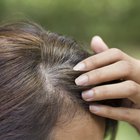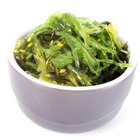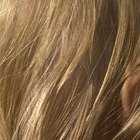
Accelerated hair loss is daunting, with very little prospect of reversing. It comes with unwanted social stigma, which can affect the quality of your life. To date, prevention is the best option for keeping and regenerating your hair. Among preventative measures, studies have shown the benefits of marine algae, also known as seaweed, for hair growth and maintenance. Adding seaweed to your diet may help in restoring and growing your hair.
Cause of Hair Loss
According to the Mayo Clinic, there is no one specific disorder or state that leads to hair loss. Factors such as hormonal changes, medications, poor nutrition, irritation and damage from hair treatments can all contribute to unwanted loss. On average, losing 50-100 hairs per day is considered normal. Moreover, hair grows in cycles, in states of rest and growth, but when the “rate of shedding exceeds the rate of growth,” thinning and baldness may ensue.
Traditional Use of Seaweed
Though seaweed consumption is fairly new to the West, seaweed has been a part of the Asian diet for centuries. Asians use seaweed in soups, salads and other dishes as a nutritious low-calorie food. In the West, the food industry has traditionally used seaweeds for their polysaccharide extractives —alginate, carrageenan and agar, according to “Trends in Food Science in Technology.” However, in recent decades, seaweed has been introduced as a major whole-food ingredient.
Benefits of Seaweed
According to "Nutrition Reviews," seaweeds have higher levels of minerals such as calcium than terrestrial vegetation and contain essential fatty acids omega-3 and omega-6. Many seaweeds get direct sunlight, making them rich in antioxidants; vitamins A, B, C and E, and protective pigments. In addtion, some seaweeds, such as nori, are high in protein, while brown seaweeds contain chlorophyll for photosynthesis. Iodine, iron, phosphorous, potassium, manganese, porphyran, copper, and zinc are also found in seaweeds. Jacqueline Renfrow, author of "Health Solutions From the Sea," notes that the alginates in seaweeds have detoxifying agents that can help to eliminate toxins and heavy metals.
Seaweed for Hair Growth
Seaweed alone contains many of the necessary vitamins and minerals needed for hair growth. For instance, according to "Alive: Canadian Journal of Health & Nutrition," omega-3 fatty acids feed hair follicles to stimulate growth, and iron and zinc maintain hair production. Zinc deficiency leads to hair shedding. Moreover, vitamins A and C are also needed to produce sebum, which acts as a natural hair conditioner; vitamins B and E help maintain healthy hair. Calcium, rich in seaweed, is another vital mineral in hair production. Finally, detoxifying the body can promote healthier hair growth.
Some Edible Seaweeds
Nori is what you find wrapped around your sushi rolls. It comes in dried square sheets. Dulse is a salty red alga and has a bark-like structure. Hijiki looks like dried dark stems, and sea lettuce is a bright green alga that looks much like terrestrial lettuce. It is known for its strong seafood taste and smell. Finally, kelp is the seaweed that typically washes up on shores and is best for raw recipes. However, all these forms are suitable in soups, salads or side-dishes.
Related Articles

Chlorella and Hair Loss

Essential Enzymes for Hair Growth

Staple Foods in Africa

Tips to Grow Pubic Hair

Benefits of Lotus Stem

What is Hair Composed of?

Arginine for Hair Growth

Blueberries for Hair Growth

Ham Nutrition Information

Kasoori Methi Nutrition

Why Is Seaweed Good for the Thyroid?

How to Use Lettuce for Hair Growth

How to Get Black Hair to Thicken

Basil for Hair Growth

List of Wild Edible Plants & Berries in ...

How to Use Wheatgrass for Washing Hair

L-Lysine for Hair Growth

Selenium & Silica

Sources of Calcium in Indian Food

Ingredients in Hairfinity Vitamins
References
- "Trends in Food Science & Technology": Seaweed in Food Products: Biochemical and Nutritional Aspects; Serge Mabeaua and Joël Fleurence; April 1993
- MayoClinic.com: Hair loss: Causes
- "Nutrition Reviews": Nutritional Value of Edible Seaweeds; Paul MacArtain PhD, Christopher I.R. Gill PhD, Mariel Brooks PhD, Ross Campbell, Ian R. Rowland PhD
- "Better Nutrition"; Health Solutions from the Sea; Jacqueline R. Renfrow; November 2007
- "Alive: Canadian Journal of Health & Nutrition"; Eat Your Way to Healthy Hair; Emily Beecher; September 2008
Writer Bio
Yangok Chu has been a freelance writer and a professional writing tutor at community colleges in Southern California and Houston since 2000. She also served as a staff contributor for the online publication WhoisIsabella. She has a Bachelor of Arts in English from the University of California at Santa Barbara.
Photo Credits
hair image by Dubravko Grakalic from Fotolia.com